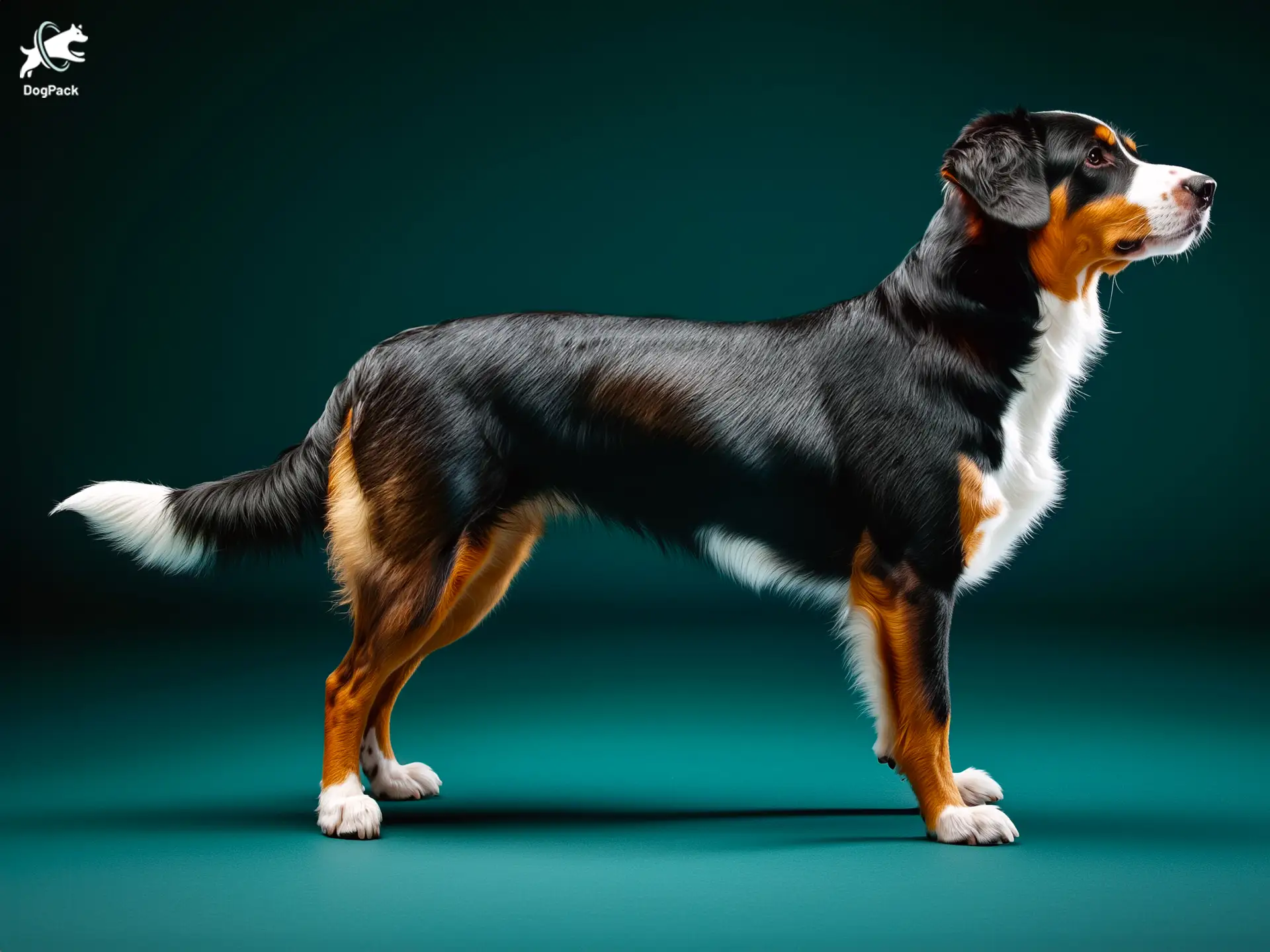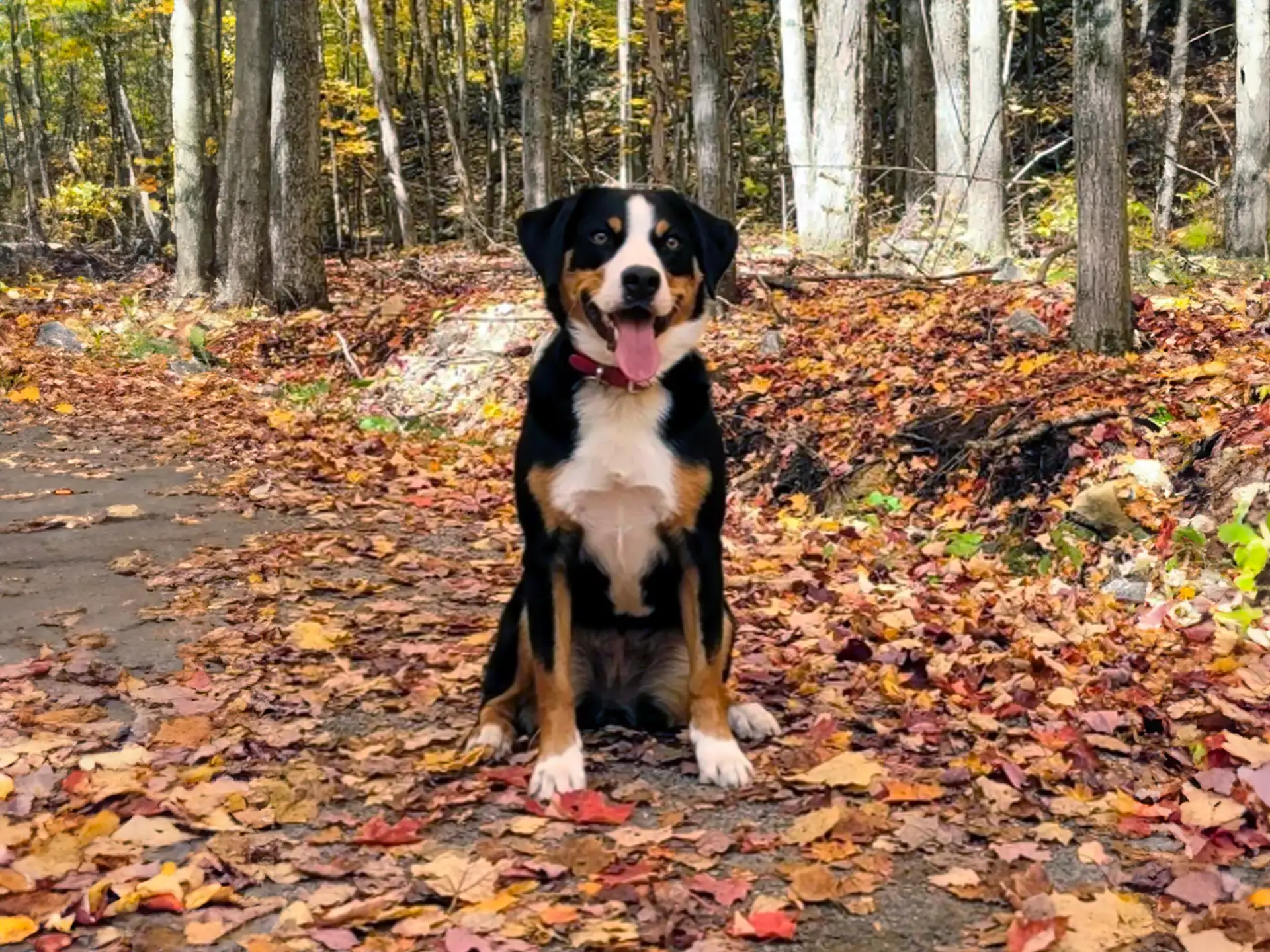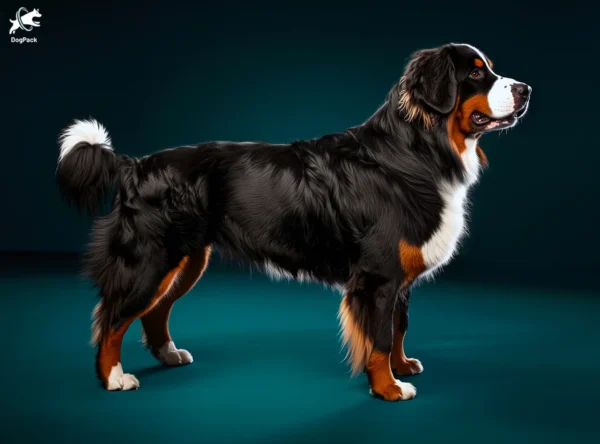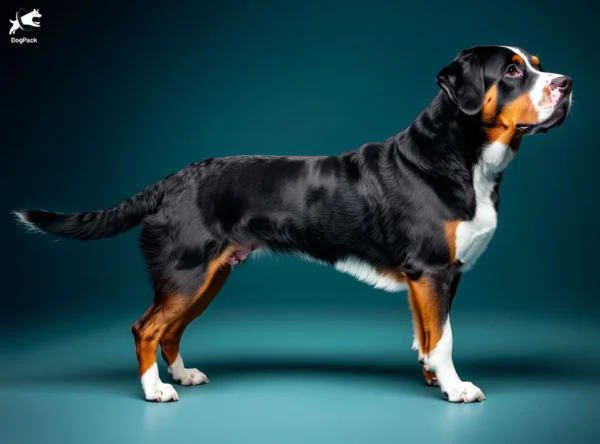Appenzeller Sennenhund Dog Breed Info & Overview
The Appenzeller Sennenhund is a remarkable Swiss mountain dog, combining intelligence, agility, and loyalty. Originally bred for herding and guarding livestock, this versatile breed excels at work yet is equally devoted to its family. Whether guiding cattle through rugged terrain or joining you on outdoor adventures, the Appenzeller thrives in active environments while offering endless affection at home, making them an ideal companion for adventurous families.
Characteristics
Pictures
Breed History
Originating in the alpine region of Switzerland, the Appenzeller Sennenhund has a rich history as a hardworking farm dog. Bred for herding and guarding livestock, this breed is one of four Swiss mountain dogs that have been essential to Swiss farmers for centuries.
Despite its long history, the Appenzeller remained relatively unknown outside Switzerland until the late 19th century. In 1898, the breed was officially recognized in Switzerland, thanks to the efforts of Albert Heim, a geologist and dog enthusiast who documented Swiss breeds.
The breed’s name comes from the Appenzell region where it was first identified. “Sennenhund” translates to “herdsman’s dog,” reflecting its primary role in pastoral life. Today, while still rare globally, the Appenzeller continues to be valued for its versatility and work ethic.
Temperament, Personality
Brimming with energy and intelligence, the Appenzeller Sennenhund is a dog that thrives on activity and purpose. They are known for their alertness and make excellent watchdogs, always ready to notify their family of any unusual happenings.
With family members, they are affectionate and loyal, forming strong bonds that make them wonderful companions. However, their herding instincts can sometimes translate into nipping or herding behaviors, especially with young children, so early training is essential.
Strangers may be met with caution, as this breed is naturally protective of their territory. Socialization from a young age can help them become more accepting of new people and situations, ensuring they grow into well-rounded adults.
Physical Characteristics
The Appenzeller Sennenhund is a medium to large-sized dog with a muscular build, reflecting its working heritage. They have a distinctive tri-color coat: black or brown base with symmetrical white and rust markings that make them stand out.
Their double coat is thick and glossy, providing insulation against harsh weather conditions in the mountains. The outer coat is dense and lies close to the body, while the undercoat is softer, offering additional warmth.
One of their most notable features is their high-set, curled tail, which lies over the back—a trait common among the Swiss mountain dogs. Their ears are medium-sized and pendant, adding to their expressive and alert appearance.
Health Issues
Generally a healthy breed, the Appenzeller Sennenhund has a few genetic health concerns to be aware of. Hip dysplasia is one such issue, common in many medium to large breeds, which can affect mobility as they age.
Progressive Retinal Atrophy (PRA), a degenerative eye disorder, has been reported in some lines. Regular eye examinations can help detect this condition early and manage its progression.
Epilepsy is another condition that may occur, though it’s relatively rare. Responsible breeders will screen for these health issues, so it’s important to obtain your Appenzeller from a reputable source.
Grooming Needs
With their short double coat, the Appenzeller’s grooming needs are fairly manageable. Weekly brushing is usually sufficient to remove loose hairs and keep their coat looking its best.
During shedding seasons in spring and fall, more frequent brushing may be necessary to manage the increased hair loss. A slicker brush or grooming mitt can help expedite the process.
Bathing is required only occasionally, as over-bathing can strip the coat of its natural oils. Regular nail trimming, ear checks, and dental hygiene should also be part of their grooming routine.
Exercise Requirements
High energy is a hallmark of the Appenzeller Sennenhund, and they require ample daily exercise to stay content. This isn’t a breed that will be satisfied with a short walk around the block.
Activities like hiking, jogging, and agility training are excellent ways to engage both their physical and mental faculties. They excel in dog sports and enjoy any task that challenges them.
Without sufficient exercise, they may become bored and develop unwanted behaviors such as chewing or digging. Providing at least 1–2 hours of vigorous activity daily is essential for their well-being.
Training Tips
Intelligent and eager to please, the Appenzeller responds well to positive reinforcement training methods. Consistency and patience are key, as they can sometimes be independent thinkers.
Early socialization is crucial to help them adapt to various people, animals, and environments. Puppy classes and exposure to different situations can make a significant difference in their adult behavior.
Given their herding instincts, they may try to herd people or other pets. Redirecting this behavior through training and providing appropriate outlets can help mitigate potential issues.
Nutrition, Diet
Feeding an Appenzeller Sennenhund requires attention to their high energy levels. A diet rich in high-quality proteins and fats will support their active lifestyle and maintain muscle mass.
Portion sizes should be tailored to their age, weight, and activity level. Generally, they may consume between 2.5 to 3.5 cups of dry food per day, divided into two meals to prevent bloating.
Consulting with a veterinarian can help determine the optimal diet plan. Some Appenzellers may benefit from diets formulated for active or working breeds, providing the necessary nutrients for their demanding routines.
Adoption, Breeders
Finding an Appenzeller Sennenhund may require some effort, as they are relatively rare outside of Europe. Start by contacting breed clubs or organizations dedicated to Swiss mountain dogs.
Reputable breeders should provide health clearances and be open about the lineage of their dogs. Visiting the breeder and meeting the puppy’s parents can offer insight into the temperament and health of your future pet.
Consider reaching out to rescue groups that specialize in Swiss breeds. Websites like the Appenzeller Sennenhund Club ofAmerica provide resources for adoption and breeder referrals.
Family Pet?
The Appenzeller can make a wonderful family pet for the right household. Their affectionate nature and loyalty mean they form strong bonds with family members.
However, their high energy levels and herding instincts mean they are best suited to families with older children who can participate in their exercise and training needs.
With proper socialization and training, they can get along with other pets, although their natural tendencies may require management to ensure harmony in a multi-pet household.
Right For You?
If you’re an active individual or family seeking a loyal and energetic companion, the Appenzeller Sennenhund might be the perfect match. They thrive in environments where they have space to roam and tasks to perform.
Apartment living is generally not ideal for this breed due to their size and exercise needs. A home with a large, securely fenced yard is preferable to keep them safe and content.
Ultimately, owning an Appenzeller is a rewarding experience for those prepared to meet their physical and mental needs. Their devotion and spirited nature offer endless joy to the right owner.
Conclusion
Bringing an Appenzeller Sennenhund into your life is embracing a breed rich in history and bursting with energy. Their intelligence and affectionate nature make them exceptional companions for active owners. If you’re ready for a loyal sidekick that thrives on adventure and purpose, the Appenzeller could be your ideal canine companion.
FAQs
-
Is the Appenzeller Sennenhund good for first-time dog owners?
The Appenzeller Sennenhund may not be the best choice for first-time owners due to their high energy and training needs. They require consistent training and plenty of exercise to thrive.
-
How much does an Appenzeller Sennenhund puppy cost?
An Appenzeller puppy can cost anywhere from $1,000 to $2,500, depending on the breeder and lineage. Due to their rarity, prices may be higher and waitlists common.
-
Does the Appenzeller Sennenhund get along with other dogs?
With proper socialization, the Appenzeller Sennenhund can get along well with other dogs. Early exposure and training are key to fostering positive interactions.
-
Is the Appenzeller Sennenhund a good guard dog?
Yes, the Appenzeller has strong protective instincts and is naturally alert, making them excellent guard dogs for homes and farms.
-
What kind of jobs can an Appenzeller Sennenhund do?
The Appenzeller excels in herding, guarding, search and rescue, and agility sports. Their intelligence and agility make them versatile working dogs.
Breed Ratings
The Appenzeller Sennenhund is highly intelligent, making training both rewarding and engaging.
They are playful and enjoy interactive games, especially those that challenge them mentally.
This breed has abundant energy and requires daily vigorous exercise to stay happy.
Moderate shedding occurs year-round, with heavier shedding during seasonal changes.
They have a moderate prey drive due to their herding background, which may lead to chasing behaviors.
Their short coat is relatively low-maintenance, requiring minimal grooming efforts.
They are eager learners but may exhibit independence; consistent training is effective.
They prefer companionship and may become anxious if left alone for extended periods.
Being alert watchdogs, they may bark frequently to signal changes in their environment.
The Appenzeller Sennenhund has minimal drooling tendencies.
With proper socialization, they can be friendly with other dogs, though supervision is recommended.
Generally healthy, but awareness of potential genetic issues is important for preventative care.














